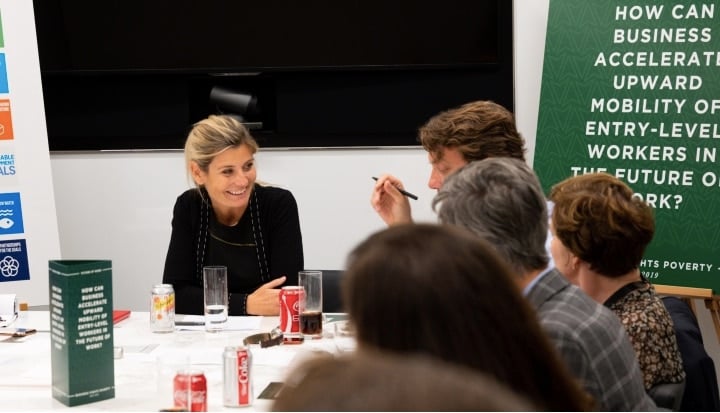During Business Fights Poverty New York, a select group of professionals from the business, academia and the international development community explored how companies are responding to disruptive trends affecting the Future of Work, such as automation, the rise of artificial intelligence, and new forms of independent employment and how companies are preparing their workforce for these transitions.
Companies need a People-Centric Commitment and Vision for how their workplace will change.
All businesses need to be thinking ahead to help workers stay relevant, by articulating a clear people-centric commitment and a proactive vision of how their workplace will change and how it will impact their people. Company visions should put their people at the heart of these changes, with technology acting as an enabler to improve the human experience of work, for example through better training, new career opportunities, and digital enablement of workers in all jobs. We must act now to identify the capabilities and skills that workers will need, and support people through the transition. People-centric visions for the future should include the wider ecosystem of suppliers, customers, local communities, as well as potential collaborators – for example other companies working in the same region or industry.
Supporting workers through the transition
The set of skills required is also evolving and we realise that the need for soft skills is increasing as the content and type of jobs evolve. Businesses are uniquely positioned to help workers build these soft skills – such as digital literacy, data-based decision making, collaboration, and empathetic customer service. It is also critical for businesses to foster a “culture of life-long learning”, including by making on-the-job training and intentional career pathways a more central part of the overall mix of workforce training. In an environment of rapid job and task transformation, businesses are often best positioned to provide the most relevant and agile training. This works best when employees have transparent incentives – and customizable options – to take responsibility for their own career development. This could include on-the-clock classroom and practicum training, financial support, time, social learning, and incentives for learning. It is particularly important to recognize the substantial social inclusion benefit of businesses providing on-the-job training and career development for workers who have previously struggled in formal education or who are otherwise suffering from barriers to engagement in learning activities.
To motivate staff, companies should espouse a clear sense of social purpose, so that all employees understand the contribution of their role to a greater goal. It is also vital to broaden routes for career progression and consider career experiences that go beyond the traditional career path, opening up more opportunities for workers to move laterally across functions and between sectors, as well as vertically up the career hierarchy, both within a business and from one business to other work. Secondments are also a great way to grow skills and foster learning agility. These can be internal secondments across different departments and markets, as well as externally through partnerships with the non-profit and public sectors.
Our Challenge Partner, Walmart, outlined at the session initiatives and programs it has developed that provide its people with career development opportunities to help them grow further in their career and to acquire new skills. The Pathway Program has provided foundational learning for new workers, to explain the retail model and build soft skills. In addition, over 200 Walmart Academies have trained over 500,000 associates over the last four years, using classroom and sales floor exercises to teach advanced retail skills. Academy training grows confidence, improves job satisfaction, and boosts Associates’ marketable skills so that they can better progress in their careers. Initial data suggest that retention increases for both graduates of Academy training and for their teams. To remove barriers to higher education, Walmart creates access to debt-free higher education through its Live Better U program in partnership with Guild Education, enabling associates to enroll in online degree programs in business and technology, for a dollar a day. All Walmart’s initiatives are underpinned by its learning culture, expressed in the maxim “Thirty for Learning”, which encourages all associates – even those who feel unable to take on significant training – to allocate half an hour per week for their own development.
Businesses are shifting their mindset to look beyond their own organisations to develop a wider pool of talent which benefits everyone. Some may fear that their training investment may be lost when staff leave the company, but our participants reported that, on the contrary, such investment has a positive impact on recruitment and staff retention. Collaboration between businesses and across sectors can help share the cost of developing transferable skills needed across the board. Given the rise of more flexible models of employment such as the gig economy and freelancing, business needs to consider how they tap into a wider talent pool, and what their responsibility is to develop workers operating outside traditional employment.
Create “unlikely partnerships” to make impact at scale
Businesses are considering how to collaborate more – either across industries or with governments or non-profit sectors – and to create “unlikely partnerships” which can make an impact at scale. For example, businesses could provide baseline skills assessments of entry-level employees to government and help shape education policy that is fit-for-purpose for the new era of work. Many examples of companies were shared where they have been collaborating and providing support or collaboration on access to education and mentoring for young people. Companies are also contributing to the formalisation and stability of emerging economies by integrating small and medium-sized businesses into their supply chains, providing them support and working together to continually raise global minimum standards in relation to benefits systems and social safety nets. Supporting entry-level workers to thrive in the future of work requires us all to play our part, through collaboration between business, governments and non-profit sectors.
How are you supporting your entry-level workers to thrive in the future of work? If you would like to contribute your ideas and experience to the Future of Work Challenge, please do get in touch.










